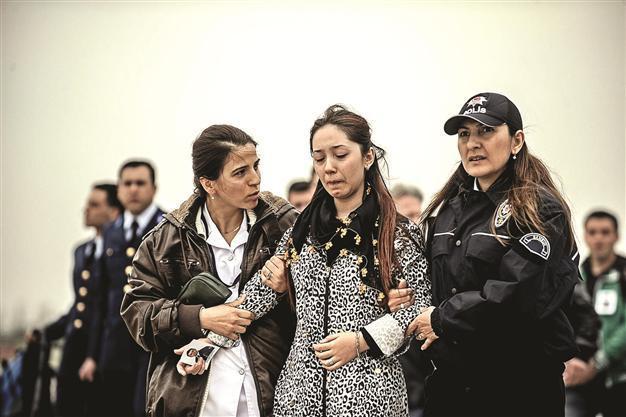Killing of soldier in Diyarbakır deepens concerns amid rising PKK violence
ANKARA

Nejdat Aydoğdu was out shopping with his wife in central Diyarbakir when he was shot by gunmen at close range. AA Photo
Compounding the atmosphere of mistrust amid an upsurge of militant activity by the outlawed Kurdistan Workers’ Party (PKK), another member of the Turkish Armed Forces (TSK) lost his life on Oct. 30, a day after he was shot by two masked gunmen in Diyarbakır, the largest city in the predominantly Kurdish populated southeastern Anatolian region.The General Staff, while announcing non-commissioned officer Nejdet Aydoğdu’s death in a written statement, recalled that Aydoğdu was out shopping with his wife in central Diyarbakir when he was fired at by the gunmen at close range.
Typically, when the General Staff wants to indicate that perpetrator of an attack or a killing was the PKK, it uses the phrase “a terrorist group” or “members of a terrorist organization.” In its Oct. 30 statement, it did not use any of those phrases or refer to the PKK directly, but it used notably strong language to “vehemently condemn” the attack, describing it as "brutal and treacherous.”
The General Staff had earlier reaffirmed that a similar attack killing three off-duty soldiers in Yüksekova in the southeastern province of Hakkari on Oct. 25 was carried out by the PKK. That attack was also committed by masked gunmen in a busy street in the afternoon.
The PKK has waged a three-decade insurgency for self-rule and greater rights in southeastern Turkey, but has largely observed a ceasefire since March 2013 amid a fragile ongoing peace process.
Having recently been under fire from the ruling Justice and Development Party (AKP) government due to the language it employed in the wake of the Oct. 25 attack, the Peoples’ Democratic Party (HDP), a key player in the Kurdish political movement, condemned the latest attack.
“We state that we never accept these kinds of attacks and we condemn them,” the HDP said in a statement released late on Oct. 29, after the shooting of the non-commissioned officer.
Certain phrases used by the HDP after the attack in Yüksekova allegedly attempted to legitimize the attack, with the government saying that the HDP had tried to portray the attack as retaliation for the killing of three PKK members by security forces on Oct. 23 in the eastern province of Kars, after they reportedly attacked a hydroelectric power station in the Kağızman district.
“Nobody can consider the state’s legitimate security forces and terrorists to be on the same level. It is not possible for us to accept an argument such as ‘retaliation for the killing of three terrorists,’” Prime Minister Ahmet Davutoğlu said on Oct. 26.
On Oct. 29, the HDP said “recent developments have unfortunately proven them right to have been concerned,” adding that Turkey was being dragged into an environment of uncertainty.
“As the HDP, we are determined to do our part for stopping the developments before they further harm the social and political environment and before they lead to unwanted results. Once again, we call on everybody to fulfill the requirements of common sense and the peace process, to stay away from stances that would drag Turkey back into a conflict environment,” the HDP stated.
Meanwhile, Nationalist Movement Party (MHP) leader Devlet Bahçeli said the attack in Diyarbakır was a direct result of the government-led resolution process aimed at ending the three-decade long conflict between the PKK and Turkey’s security forces. Bahçeli dubbed the process a “disintegration process.”
“Murderers who revived throughout the disintegration process, who pulled themselves together throughout the treason process and who became strong with the destruction project, are feloniously attacking the children of the homeland,” Bahçeli said in a message posted to his Twitter account late on Oct. 29.
The upsurge in militant violence in southeastern Anatolia follows deadly protests earlier in October against the government’s handling of efforts to counter jihadists across the border in Syria. The PKK’s armed wing this week issued a statement denying responsibility for the Yüksekova attack and some analysts believe the group may be split over its strategy in the peace process.
The General Staff, meanwhile, on Oct. 29, made clear in a statement that Fazıl Çağrı, a PKK militant in charge of the Yüksekova area, was mentioned as the instigator of the killing in an intercepted radio call between local PKK leaders on Oct. 28.
















